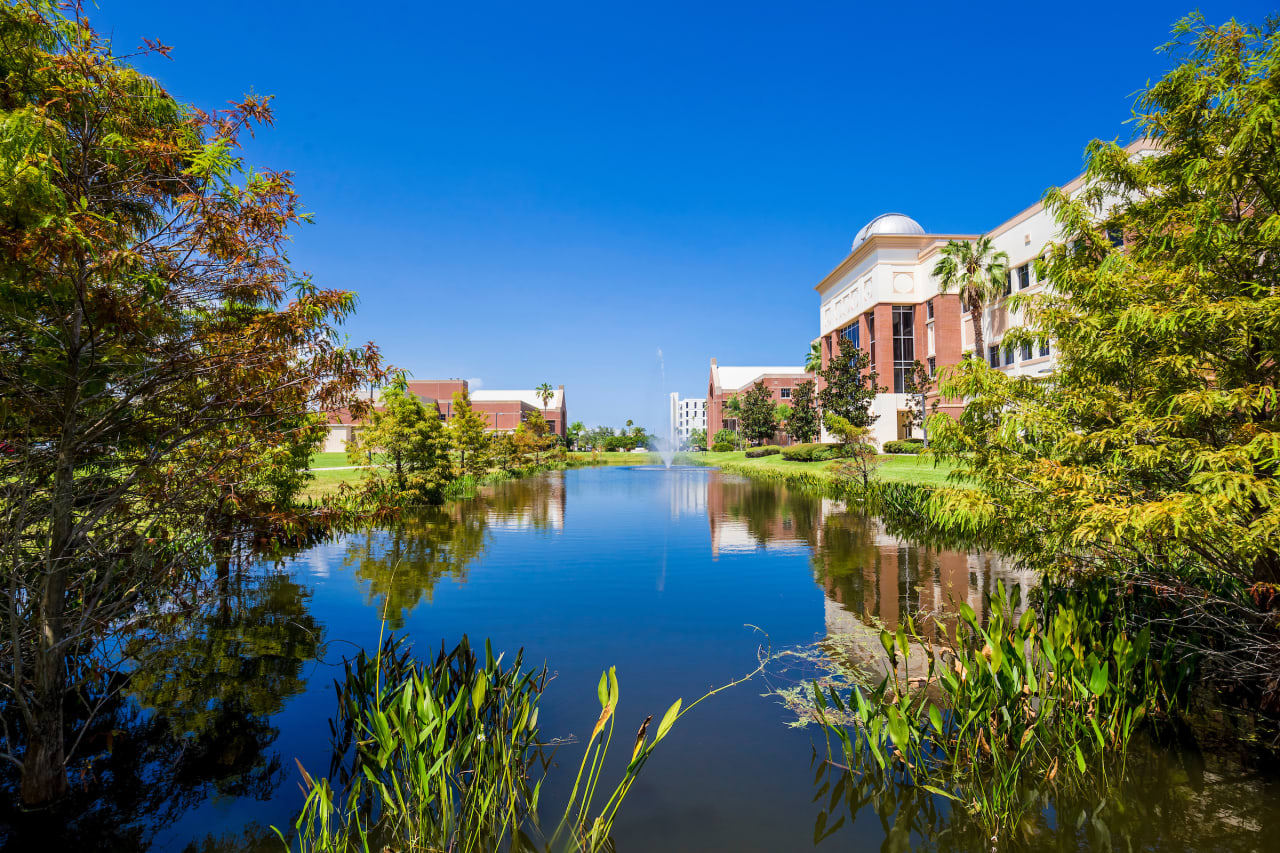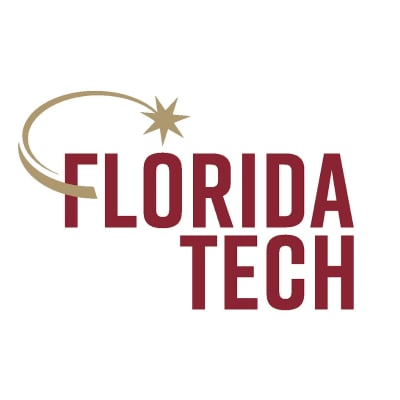
BS in Mathematical Sciences
Florida Institute of Technology

Key Information
Campus location
Melbourne, USA
Languages
English
Study format
On-Campus
Duration
4 years
Pace
Full time
Tuition fees
USD 21,173 / per semester
Application deadline
Request info
Earliest start date
Sep 2024
Introduction
What is a Mathematical Sciences Degree?
The mathematical sciences degree curriculum is designed primarily for dual majors in biology, chemistry, physics, or an engineering discipline. During the first two years of study, students in this program take the same courses as those students getting an applied mathematics degree, followed by upper-division mathematics courses (such as numerical analysis and modeling) in the final two years. Students also take electives in social science, computer science, and engineering.
Whether you want to study the intricacies of discrete mathematics, design neural networks, or develop a better web search algorithm, Florida Tech’s mathematical sciences degree gives you a strong background in calculus and experience in science and engineering.
Internationally Recognized Faculty — Personalized Attention
Students attending a mathematics university like Florida Tech benefit from working with knowledgeable mentors who put students’ success first. The Department of Mathematical Sciences faculty members all have doctoral degrees in their field and are highly respected on an international level. They teach all classes and are involved in meaningful research work, which often involves undergraduate students, something many students look for in choosing a mathematics university.
We get students involved in faculty-run interdisciplinary research during their freshman year. The program is hands-on, modeling-based, and includes lab and field experiments as part of your program. Some of the research you may be involved in includes applied statistics, mathematical programming, neural networks, combinatorial optimization, operations research, and queuing theory.
Located in the Heart of Florida’s High-Tech Corridor
Florida Tech is the perfect place for a Mathematical Sciences degree. The 130-acre campus is located on the Space Coast (so named because of the presence of NASA and the Kennedy Space Center on Cape Canaveral just north of us), minutes away from the Indian River Lagoon, the most diverse estuary in North America.
The area has the fifth-largest high-tech workforce in the country, with more than 5,000 high-tech corporations and government and military organizations located nearby. This workforce also provides an abundance of internship and employment opportunities.
Florida Tech is just over the causeway from the Atlantic Ocean with its 72 miles of beautiful beaches, and a short trip to the Florida Keys or the Orlando theme parks. We also have a rich campus life that includes a wide range of intramural and collegiate sports, clubs, and social activities.
Build Lasting Professional Relationships through Campus Organizations
Beyond the classroom, mathematical sciences majors build leadership and professional experience through participation in academic organizations like the American Mathematical Society, the Society of Actuaries, the Student Astronomical Society, the student government, and over 100 other student organizations.
The Infinity Math Club, a student-run organization, brings together students from all disciplines that share a curiosity for and interest in math. The group meets on a regular basis to discuss math problems and developments. The student chapter of the Society for Industrial and Applied Mathematics is dedicated to bringing together mathematics, science, and technology to better the world. Networking, math internships, and research join together to provide well-rounded preparation for a career in math.
Curriculum
Gain Practical Experience
Knowledge of mathematics is essential to the fields of natural science, engineering, medicine, and the social sciences, making a mathematical sciences degree a smart and practical second major. Research is mandatory for all undergraduates who choose a mathematical sciences degree.
Mathematical science students mostly work on interdisciplinary research projects at the intersection of their two majors, under the supervision of two advisors, one from each major. The curriculum includes technical electives and specialized labs, as well as an opportunity for collaborative research with a peer or professor, or to work independently on a topic of your choosing. This provides practical experience, an enhanced job search portfolio, and the perfect preparation for employment or graduate school.
Curriculum
During the first two years, mathematical sciences majors share many courses with other students. The mathematical sciences major is highly interdisciplinary and designed primarily for dual majors. At this time, applications of mathematics across disciplines routinely occur in engineering, science, and industry. The curriculum for the mathematical sciences major includes courses in mathematics as well as applied courses from related departments. Students can choose electives that will enable them to apply mathematics to engineering, the physical sciences, biological sciences, environmental studies, social sciences, and business applications. Mathematics graduates are prepared to pursue graduate work or take their place in the industry along with engineers and scientists.
Mathematics (28 credit hours)
- MTH 1001 Calculus 1 or MTH 1010 Honors Calculus 1
- MTH 1002 Calculus 2 or MTH 1020 Honors Calculus 2
- MTH 2001 Calculus 3 or MTH 2010 Honors Calculus 3
- MTH 2201 Differential Equations/Linear Algebra or MTH 3200 Honors Differential Equations
- MTH 3102 Introduction to Linear Algebra
- MTH 4101 Introductory Analysis
- MTH 4201 Models in Applied Mathematics or MTH 4202 Stochastic Modeling
- MTH 4990 Undergraduate Research (Q)
Communication and Humanities Core (13 credit hours)
- COM 1101 Composition and Rhetoric
- COM 1102 Writing About Literature
- FYE 1000 University Experience
Select the first HUM Core Course:
- HUM 2051 Civilization 1: Ancient Through Medieval
- HUM 2141 World Art History 1: Pre-History to Early Global Awareness
- HUM 2211 British Literature and Culture
- HUM 2212 British and American Literature 1
- HUM 2331 American History: Pre-Columbian to Civil War Era
- HUM 2551 Survey of Ancient and Medieval Philosophy
Select the second HUM Core Course:
- HUM 2052 Civilization 2: Renaissance Through Modern
- HUM 2142 World Art History 2: Early Modern to Post-Colonial
- HUM 2212 British and American Literature 1 (may not be repeated for credit)
- HUM 2213 British and American Literature 2
- HUM 2332 American History: From Reconstruction to the Present
- HUM 2552 Survey of Modern and Contemporary Philosophy
Computer Science (8 credit hours from the following)
- CSE 1001 Fundamentals of Software Development 1
- CSE 1002 Fundamentals of Software Development 2
- CSE 2010 Algorithms and Data Structures
Science (16 credit hours from the following)
- BIO 1010 Biological Discovery 1 and BIO 1030 Introduction to Biotechnology
- BIO 1020 Biological Discovery 2 and BIO 1040 Introduction to Biodiversity and Physiology
- CHM 1101 General Chemistry 1
- CHM 1102 General Chemistry 2
- MAR 1010 Biological Discovery 1 and MAR 1030 Introduction to Biotechnology
- MAR 1020 Biological Discovery 2 and MAR 1040 Introduction to Biodiversity and Physiology
- PHY 1001 Physics 1
- PHY 2002 Physics 2
- PHY 2091 Physics Laboratory 1
- PHY 2092 Physics Laboratory 2
Electives (60 credit hours)
- Applied Area Credit Hours: 9
- Free Electives Credit Hours: 12
- Humanities Elective (HU) 3000-level or higher recommended Credit Hours: 3
- Restricted Electives (COM) Credit Hours: 3
- Restricted Electives (MTH) Credit Hours: 6
- Social Science Credit Hours: 3
- Technical Electives Credit Hours: 24
Positioning of electives is unrestricted. At least 30 elective credits must be at the 3000 level or higher. Choices of electives are subject to approval by the student’s advisor. Mathematics electives must include at least one proof-based course in addition to the required courses in linear algebra and analysis.
Applied area electives must be taken from a single area of application. Typically, this means from a single department or program other than mathematics. Any science or engineering program can be chosen. Suitably chosen management courses (courses with mathematics prerequisites) can also be taken.
Note: Upper-division mathematics courses may be offered in alternate years.
Career Opportunities
Career Outlook
What can you do with a math degree? Study the intricacies of discrete mathematics, design neural networks, or develop a better web search algorithm for example. Careers with a math degree aren't at all limited. In fact, 95 percent of the Mathematical Science degree majors at Florida Tech have a dual major in disciplines such as engineering, physics, chemistry, or the biological sciences.
Mathematicians always have been and always will be in demand. The US Department of Labor’s Bureau of Labor Statistics (BLS) Occupational Outlook Handbook provides extensive information about hundreds of jobs, including careers available with a math degree. The BLS states careers with a math degree are projected to increase by 16% between 2010 and 2020.
Facilities
English Language Requirements
Certify your English proficiency with the Duolingo English Test! The DET is a convenient, fast, and affordable online English test accepted by over 4,000 universities (like this one) around the world.